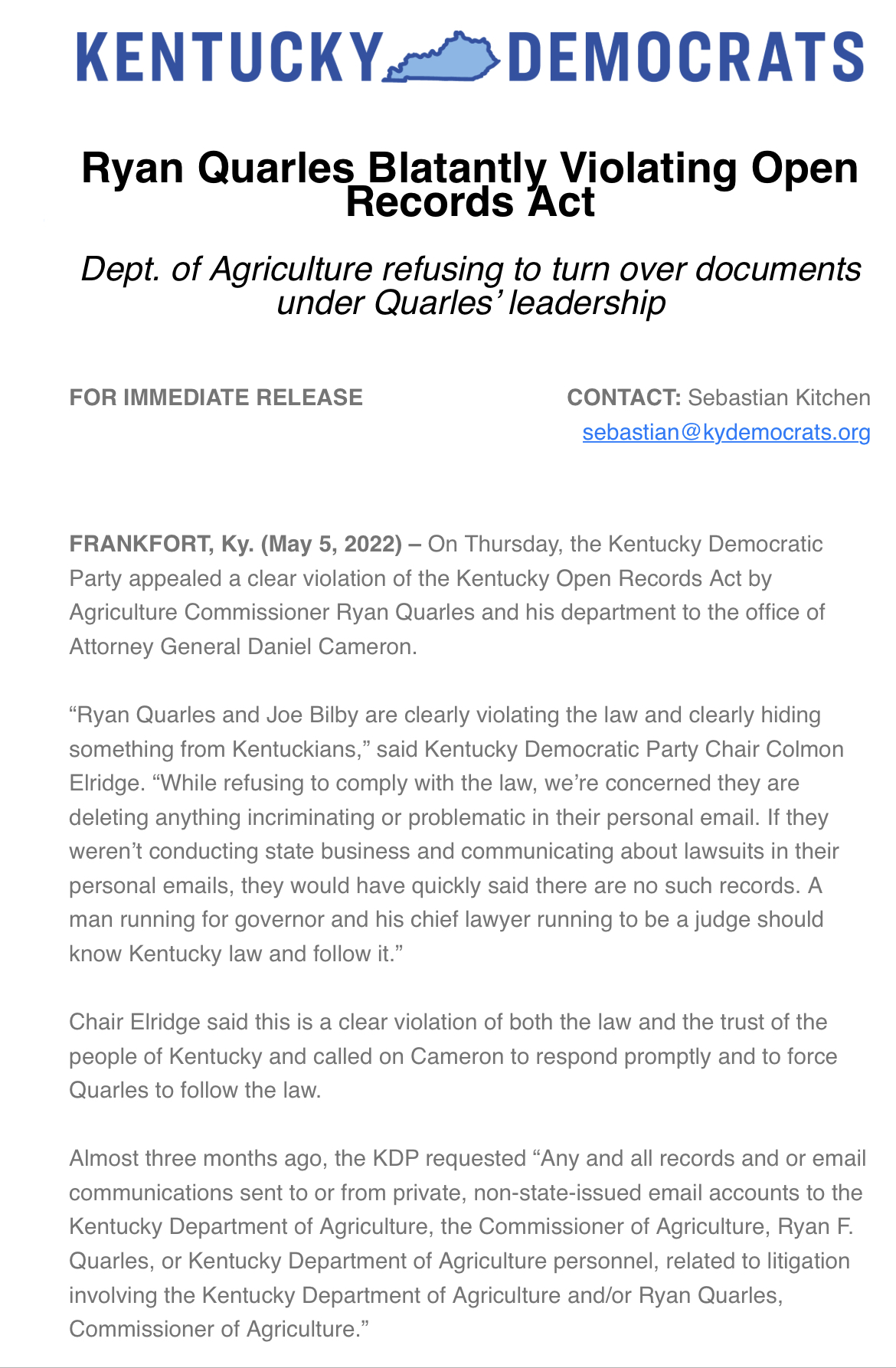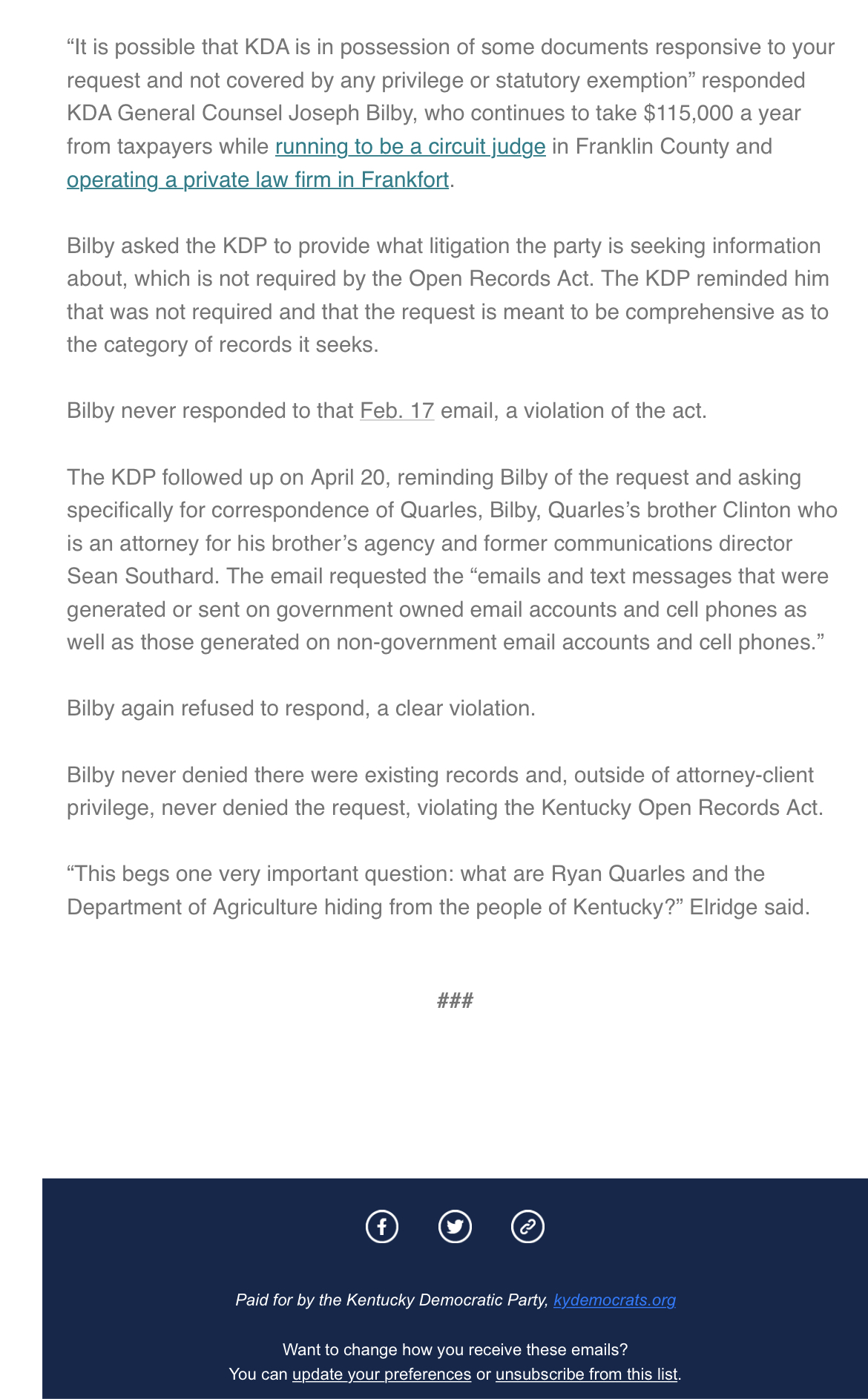

A May 5 press release from the Kentucky Democratic Party portends potentially troubled legal waters ahead for the Office of the Kentucky Commissioner of Agriculture.
The release indicates that the Democratic Party today filed an appeal with Kentucky Attorney General Daniel Cameron, challenging Agriculture Commissioner Ryan Quarles’ handling of an “almost three month old” open records request.
The Democratic Party requested “all records and or email communications sent to or from private, non-state-issued email accounts to the Kentucky Department of Agriculture, the Commissioner of Agriculture, Ryan F. Quarles, or Kentucky Department of Agriculture personnel, related to litigation involving the Kentucky Department of Agriculture and/or Ryan Quarles, Commissioner of Agriculture.”
Quarles’ office responded through General Counsel Joseph Bilby. “It is possible,” Bilby acknowledged, “that KDA is in possession of some documents responsive to your request and not covered by any privilege or statutory exemption.” He asked the Democratic Party to clarify to what litigation the open records request referred.
In a February 17 reply, the Democratic Party declined to narrow the scope of its request to a single named case or cases, asserting that it “was not required [to narrow its request] and that the request is meant to be comprehensive as to the category of records it seeks.”
Bilby did not respond to the February 17 email.
In an April 20 follow-up, the Democratic Party reminded Bilby of the earlier request and “ask specifically for correspondence of Quarles, Bilby, Quarles’s brother Clinton, and former communications director Sean Southard,” consisting of “emails and text messages that were generated or sent on government owned email accounts and cell phones as well as those generated on non-government email accounts and cell phones.”
The Democratic Party received no response to its April 20 followup.
Today’s release characterized the handling of the party’s request(s) as “a clear violation of both the law and the trust of the people of Kentucky and called on Cameron to respond promptly and to force Quarles to follow the law.” The party chair expressed concern that agency officials “are deleting anything incriminating or problematic in their personal email. If they weren’t conducting state business and communicating about lawsuits in their personal emails, they would have quickly said there are no such records.”
Politics and party aside, the handling of the request(s) by Quarles’ office raises significant open records issues.
To begin, the requester is correct. The agency’s original response was deficient and its failure to respond violates KRS 61.880(1).
With increasing frequency, public agencies seek clarification from an open records requester — particularly when the parameters of the request are broad. If not employed as a bad faith delaying tactic, this is not illegal.
Nor, however, is the requester’s refusal to “clarify” — more often a demand that s/he narrow the request.
If the requester sought communications relating to all “litigation involving the Kentucky Department of Agriculture and/or Ryan Quarles, Commissioner of Agriculture,” it was entitled to a final response based on the parameters of that request. As the requester astutely notes, the agency does not deny the existence of responsive records. Indeed, the agency acknowledges that it possesses “some documents responsive to the request and not covered by any privilege or statutory exemption.”
Once the requester declined to “clarify,” the request, it was legally incumbent on the agency to release those records “not covered by any privilege or statutory exemption” to the requester or assert a separate legal basis for denying access.
(The question of accessibility to communications on private devices and accounts about public business — which clearly includes litigation involving the Department of Agriculture and/or Quarles — and whether such requests constitute an unreasonable burden is pending in the appellate courts. In Kentucky Open Government Coalition v. Kentucky Department of Fish and Wildlife Resources Commission, the Franklin Circuit Court rejected the Commission’s argument that communications about public business on private devices are not public records, but left the door ajar for a claim of unreasonable burden.)
Additionally, the requester’s April 20 request contained a second request — insofar as it sought records on both public and private devices and accounts and was narrower in scope. The agency’s failure to respond within five business days of April 20 constituted a second violation of KRS 61.880(1).
Finally, if the agency failed to preserve all records implicated by the request, it may find itself in a serious world of hurt. An agency to which a records request is directed is legally prohibited from destroying any potentially responsive public record. Under KRS 61.882(5), KRS 61.991(2)(a), and KRS 519.060 — as well as established principles of records management law — those records are “frozen” until all legal issues have been fully resolved. Agencies and agency official risk the imposition of civil and criminal penalties if they destroy any potentially responsive record.
What should we expect now that the matter is in the Attorney General hands?
If he exercises good judgment, Cameron will assign the appeal to a merit staffer who is removed from the Byzantine politics this appeal presents.
Unless — and this is doubtful — the requested communications contain no smoking guns, the agency will go to far greater lengths to defend its position on appeal, raising new arguments and filling in all the details necessary to try to meet its burden of proving that is handling of the request(s) was proper.
It cannot prevail on the KRS 61.880(1) issue. These were clear cut violations.
But the agency may raise the defense that the records originally requested are not public records — notwithstanding the Franklin Circuit Court opinion — or, alternatively, that the request is unreasonably burdensome?
And will the Attorney General affirm based on one or both arguments?
Certainly, he has given no indication that he intends to budge from this Neanderthal misinterpretation of the open records law to date or that he will ever do so unless an appellate court tells him he is wrong.
He is wrong.
Whatever the politics of the appeal announced today, it touches on the single most serious threat to Kentucky’s open records law.



